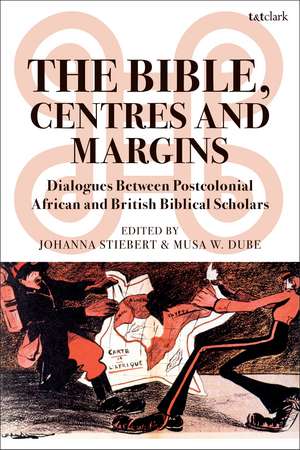The Bible, Centres and Margins: Dialogues Between Postcolonial African and British Biblical Scholars
Editat de Johanna Stiebert, Musa W. Dubeen Limba Engleză Paperback – 22 ian 2020
| Toate formatele și edițiile | Preț | Express |
|---|---|---|
| Paperback (1) | 222.37 lei 6-8 săpt. | |
| Bloomsbury Publishing – 22 ian 2020 | 222.37 lei 6-8 săpt. | |
| Hardback (1) | 713.61 lei 6-8 săpt. | |
| Bloomsbury Publishing – 11 iul 2018 | 713.61 lei 6-8 săpt. |
Preț: 222.37 lei
Preț vechi: 287.65 lei
-23% Nou
Puncte Express: 334
Preț estimativ în valută:
42.56€ • 46.21$ • 35.75£
42.56€ • 46.21$ • 35.75£
Carte tipărită la comandă
Livrare economică 22 aprilie-06 mai
Preluare comenzi: 021 569.72.76
Specificații
ISBN-13: 9780567693266
ISBN-10: 0567693260
Pagini: 176
Ilustrații: 3 bw illus
Dimensiuni: 156 x 234 mm
Greutate: 0.25 kg
Editura: Bloomsbury Publishing
Colecția T&T Clark
Locul publicării:London, United Kingdom
ISBN-10: 0567693260
Pagini: 176
Ilustrații: 3 bw illus
Dimensiuni: 156 x 234 mm
Greutate: 0.25 kg
Editura: Bloomsbury Publishing
Colecția T&T Clark
Locul publicării:London, United Kingdom
Caracteristici
Contributions from both southern African institutions and British institutions do not stand in separation but are actively engaged in dialogue, leading to useful conclusions about the trends and challenges facing the field across regions
Notă biografică
Johanna Stiebert is Associate Professor of Hebrew Bible at the University of Leeds, UK.Musa W. Dube is Professor of New Testament Studies at the University of Botswana, Botswana.
Cuprins
Acknowledgments List of Abbreviations Abstracts Contributors Foreword, by Vincent Wimbush, Founding Director of the Institute for Signifying Scriptures, USAIntroduction, by Musa W. Dube, University of Botswana, Botswana and Johanna Stiebert, University of Leeds, UK Border Crossing in Diasporic Academic Space, by Musa W. Dube, University of Botswana, Botswana Of Borders, Crossings, Colours and Botswana, by Johanna Stiebert, University of Leeds, UK Part I Paddling the Bellowing Waters Away From the Margins: African Perspectives of Proverbs 31, by Mmapula D. Kebaneilwe, University of Botswana, Botswana White is Purity: Christian Imagery, Popular Culture and the Construction of Whiteness, by Katie Edwards, University of Sheffield, UK Between Resisting White and Reflecting Black: A Hong Kong Resident's Response and Perspective, by Nancy N. H. Tan, Chinese University of Hong Kong, Hong Kong Part IIEmpire and Identity Secrecy: A Postcolonial Reflection on Esther 2.10, by Tsaurayi K. Mapfeka, King's College London, UK 'My Words Dropped Upon Them Like Dew': Toward Reimaging the Identity of African Biblical Interpreters, by Mark S. Aidoo, Trinity Theological Seminary, Ghana Locating African Biblical Scholarship as Another Generation of African Biblical Scholars Takes up the Work, by Gerald O. West, University of KwaZulu-Natal, South Africa Part III The Dark Heart of Biblical Scholarship: Western Readers and African Readings, by Hugh S. Pyper, University of Sheffield, UK Mwari and the Shona Bible: Colonial and Patriarchal Ideology in Translation, by Elizabeth Vengeyi, University of Bamberg, GermanyThe Politics of Appropriation, by Adriaan van Klinken, University of Leeds, UK BibliographyIndex
Recenzii
This collection of essays is a wonderful testimony of one-world biblical studies; the editors, both authorities in contextual biblical studies, present a high-level interchange between scholars from the global South and West about highly relevant topics of academy and life: power, gender and religion. This book is a true 'must-read' for scholars and students in contemporary biblical studies.
Our globalised time has called forth this collection. [All those] who have contributed to this volume received their Bibles via European colonialism. But this is only part of the story, for what is clear from these essays is that the Bible is now, generations later, a thoroughly African and Asian book, albeit also a contentious post-colonial book. So while it is true that there is some 'talking back' to empire, there is as much talking among ourselves. We have been joined by collaborative European dialogue partners and our intersecting conversations make it clear that we are all working in a globalised world, where imperial understandings of "centre" and "margin" are being deconstructed and reimagined.
This is an important and stimulating book that raises important questions about the privileging of white Western modes of thought in Biblical Studies. Its accessible style makes it suitable for undergraduate and seminary courses on biblical interpretation and the content will provoke discussion and debate.
Our globalised time has called forth this collection. [All those] who have contributed to this volume received their Bibles via European colonialism. But this is only part of the story, for what is clear from these essays is that the Bible is now, generations later, a thoroughly African and Asian book, albeit also a contentious post-colonial book. So while it is true that there is some 'talking back' to empire, there is as much talking among ourselves. We have been joined by collaborative European dialogue partners and our intersecting conversations make it clear that we are all working in a globalised world, where imperial understandings of "centre" and "margin" are being deconstructed and reimagined.
This is an important and stimulating book that raises important questions about the privileging of white Western modes of thought in Biblical Studies. Its accessible style makes it suitable for undergraduate and seminary courses on biblical interpretation and the content will provoke discussion and debate.
